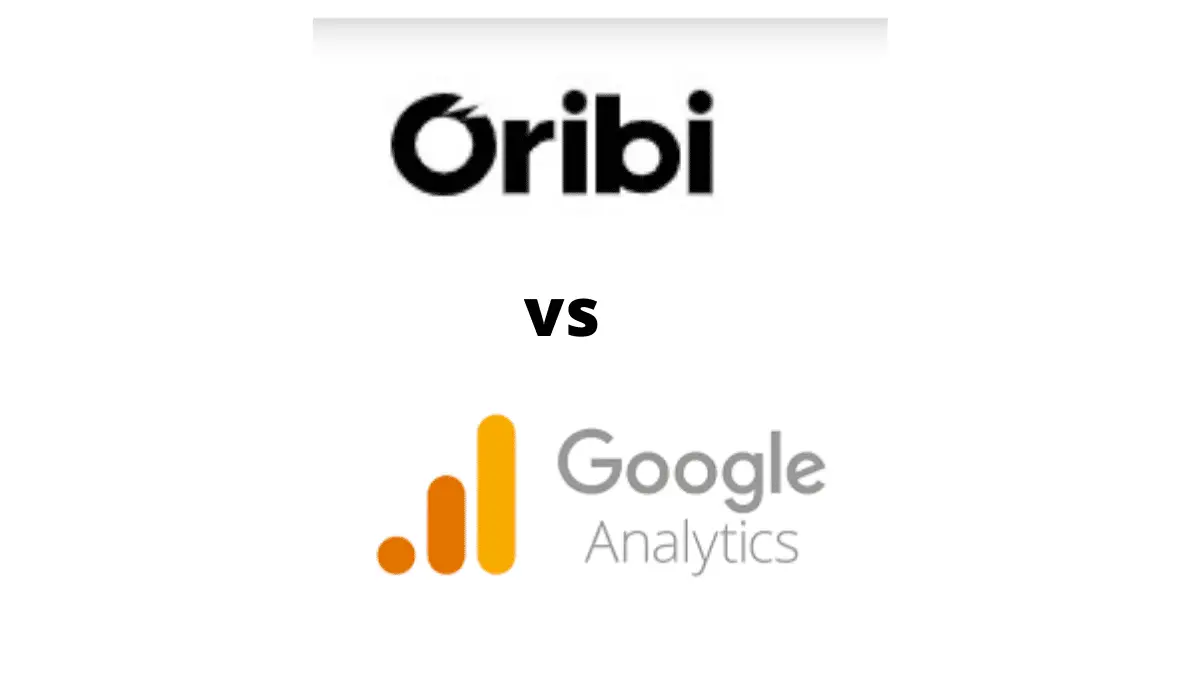
The derive to identify the best analytics tool to evaluate and optimize your marketing channels brings about Oribi vs Google Analytics comparison. This is because the benefits of web analytics cannot be over-emphasized especially among large marketing agencies and enterprises that are data-driven.
There are no doubt businesses that analyze their marketing efforts make smart decisions that can boost their sales.
That’s why I’m here to compare Google Analytics and Oribi. The goal is to help you make an informed decision as to which of the analytics tools you should opt for.
Bottom Line
Oribi is what you need if you want to be data-driven without headaches.
No coding skills and it highlights actionable steps you need to take to optimize your marketing campaign. In addition, it is less expensive compared to Google Analytics. Check out this Oribi analytics review.
Comparison Table
| Google Analytics | Oribi | |
| Dedicated Conversion Expert | No | Yes |
| Report | Yes | Yes |
| Free Plan | Yes | No |
| Actionable Insight | No | Yes |
| Better Filtering Options | No | Yes |
| Funnel Tracking | Yes | Yes |
| Data Highlights | No | Yes |
| Single Visitor Journey Tracking | No | Yes |
| Original Source Attribution | No | Yes |
| Integration | Yes | Yes |
| Button Clicks Tracking | Yes (Enable Manually) | Yes ( Automatic) |
| Campaign Tracking | Yes ( SetUp UTM Tracking) | Yes ( Automatic) |
Oribi vs Google Analytics: Overview
Before we dive into the details, let’s look at how these tools came into existence for a better understanding going forward.
What is Oribi?
This is a paid all-one marketing web analytic tool that hit the digital marketing industry in 2015. Having identified the challenges marketers who are not data-driven face with analytics, Oribi came on board.
The goal is to make web analytics easier to understand and analyze. That is why it has this slogan:
Analytics is for analysts while Oribi is for everyone.

Its cutting-edge technology empowers businesses to make smart data-driven decisions.
What is Google Analytics?
GA is one of the products of Google which was launched in November 2005 after Google bought Urchin, a statistics analytics program in March same year. It is a popular analytics tool webmasters use to analyze the performance of their website and that of their clients.
Once set up, you can track activities on your website such as bounce rate, source of traffic, average session duration, demography of your audience, etc.
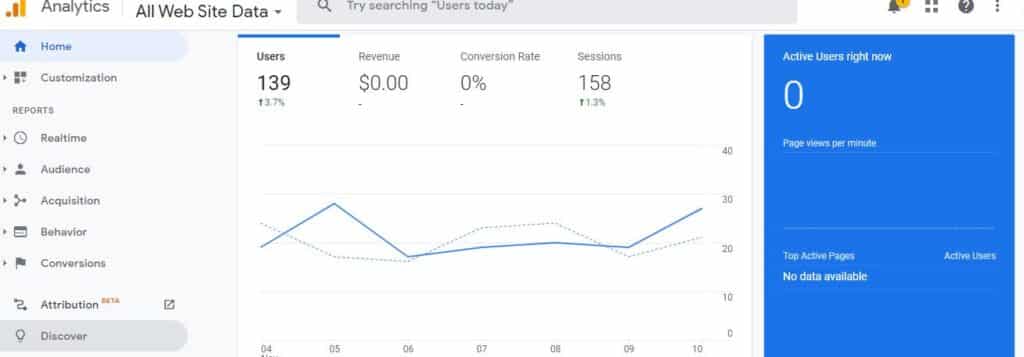
We will dive deep into that later in this artice.
The forever free plan which Google Analytics offers makes it a choice for many webmasters. However, there are advanced web analytics features that top marketing agencies and enterprises look for. It can only be found in its premium plan.
Who can use these web analytics tools?
- Website owners
- Ecommerce merchants
- Marketing agencies
- Anyone who has a need for advanced web analytics tools
Let’s dive in to compare the features which the two web marketing tools offer.
1.Funnel Tracking
A funnel is like a map you follow to reach your destination. While it guides users from one stage to another until the desired result is achieved, it is hard to ensure that the users flow from one funnel stage to another until they convert to sales. This accounts for the need to track your marketing funnels.
Oribi Funnel Tracking
Oribi’s funnel tracking is detailed and advanced. Its features make it easy for you to understand the activities that take place on your funnel. It presents visual data of the percentage audience that joined your funnel, the actions they took till they convert to sales.
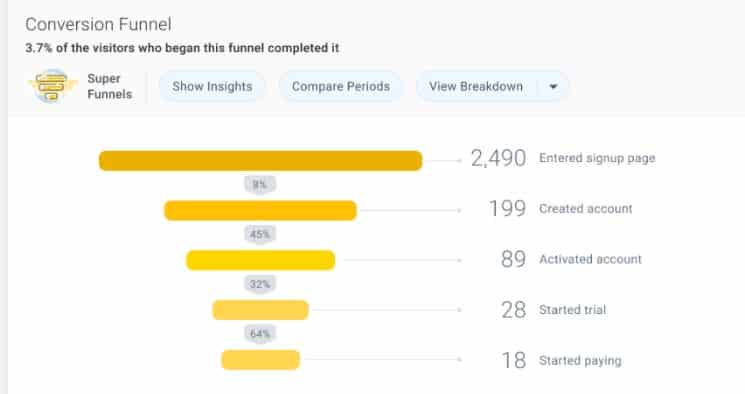
For instance, 300 target audiences entered your funnel by visiting a specific sign-up page. 10 percent of them signed up to get your freebie and only 3 percent reached the last stage of the funnel and converted to sales.
Oribi monitors and tracks every action including CTA buttons. The funnel analytics on Oribi is fast, actionable, and offers valuable insight. For example, it can show you that users on PC are more likely to take action on your funnel than users on mobile.
It narrows down to the source of the traffic to your funnel by showing which marketing channel has a higher chance of attracting people to complete your funnel.
This will help you decide on which marketing channel you should focus on. The interesting part of Oribi’s funnel tracking is that you compare the performance of your funnel filtered by geolocation, campaign, source, entry point, etc. This will tell you which of the funnel steps has a higher conversion rate.
I like the likelihood calculator feature which allows you to trigger a desire and effect. The trigger may be visiting the Help Center while the effect may be clicking on the Request Demo Button. Oribi will tell you if users who visit the Help Center are likely to complete the desired effect.
It gives a unique insight into page visits and the number of visitors that clicked on the CTA button. It tells you how long it takes to complete conversion, devices used for conversion, etc. All these are aimed at helping to optimize your marketing campaign for better conversion.
Google Analytics Funnel Tracking
You can set up a conversion funnel on GA. It also gives you an insight into user flow on your web pages. The downside of GA funnel tracking is that it pays attention only to page visits as events.
It is unlike Oribi that focuses on page visits and button clicks. It is safe to say that there is a limitation to what you can track. However, you can track button clicks if you want but it is only possible using Google Tag Manager.
You have to set up button tracking via coding. You may need a developer to do this for you if you have no coding skills. This is an advantage Oribi has over GA. That’s why Oribi insists that its tool is for everyone.
You don’t need to be tech-savvy or have coding skills. I use GA as a web analytics tool for my website and for my clients. I can tell you for free that setting up button tracking with coding isn’t easy for users without coding skills.

You may need to hire a freelance developer to do this for you. This guide teaches you how to set up Google Tag Manager. Google Analytics doesn’t have a feature that equals the likelihood calculator.
It makes it difficult to envisage how your funnel will perform before you go into the main business of promoting to your target audience. Although GA has filter options. It appears limited compared to Oribi.
Verdict: Oribi’s funnel tracking is easier compared to Google Analytics funnel tracking. Oribi gives more actionable insights on how to get the best out of your funnel. Thereby increasing the chances of target users reaching the final stage of the funnel and converting to sales.
2.Report
Report is a key web analytics feature that allows you to track and visualize metrics of interest from your dashboard. Google Analytics and Oribi offer this feature but we have to explore them to see which has an advantage over the other.
Google Analytics Report
GA allows you to create custom reports. You can decide to dive deep into your report by choosing metric( e.g Page Views Per Session) and dimension( Source/Medium). Also, you can create different reports such as:
- Site Speed Overview Report
- Goal Overview Report
- Landing Page Report
- Navigation Summary
- Channels Report
GA has lots of reporting templates and dashboards that show various metrics. This is useful for marketing agencies with many clients.
Below is a screenshot of landing page report on Google Analytics.

Learn how to create a custom report on Google Analytics.
However, the reports on GA are raw data. Unlike Oribi that processes and displays it in appealing graphics which is easy to comprehend.
Oribi Analytics Report
While GA focuses more on report templates and dashboards with raw data, Oribi cares about generating the reports in a graphic format which makes it easy for non-data analysts to understand.
For companies that evaluate reports frequently, Oribi makes it easy to segment and present reports to your organization or even to clients.
You can even brand reports through the addition of logos and making use of the customization feature. It generates a report immediately after you create it. Plus it automatically forwards the same report to your sales team or clients.
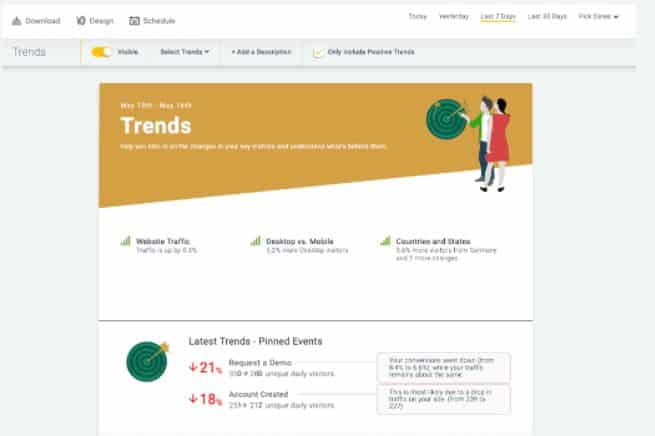
Verdict: It’s a draw here. While Oribi presents reports in a more appealing and understandable format( graphics) GA offers more report templates and dashboards.
3.Campaign Tracking
When you run Ad campaigns to your website on different marketing channels, how do you track performance?
Campaign tracking is the answer.
And if you don’t do that, you are flushing money down the toilet thinking that you are running Ad campaigns. Oribi and Google Analytics allow you to track campaigns. But you need to know which does better in this aspect.
Oribi Campaign Tracking
With Oribi, you can identify which source of traffic is generating more leads and conversions. Including the percentage lead and conversion from different channels where your campaign is running.
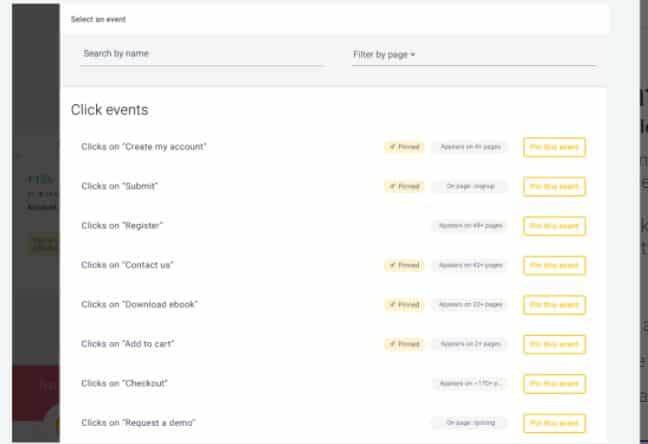
For instance, your Ad campaign is live on Quora, LinkedIn, and Instagram. It could also be that you launched an email marketing campaign.
Oribi will show you which platform is driving more sales by stating the percentage conversion of all channels.
Google Analytics Campaign Tracking

The case is different here. You have to set up your UTM tracking. Again, you may find it difficult to set up your UTM tracking if you are not tech-savvy. Not only that, GA limits you to the link the user clicked last.
To track the source, add the UTM to each link. This process can be fun if you’re conversant with GA and have worked with it for a while. Learn how to set up UTM tracking.
Verdict: I give it to Oribi. You don’t need to set up any tracking code to see the performance of your campaign on different channels.
4.Visitors Journey
Understanding the journey of your target visitor is crucial especially if you aim to convert such a visitor to a paying customer. Ecommerce businesses and brands that use content marketing to attract and retain target customers care about this. The only way to go about it is via visitor tracking. Google Analytics and Oribi offer this feature. But we have to check them out to see which is better.
Google Analytics (Visitors Journey)
GA allows you to track the activities of users on your site. This works via user flow.
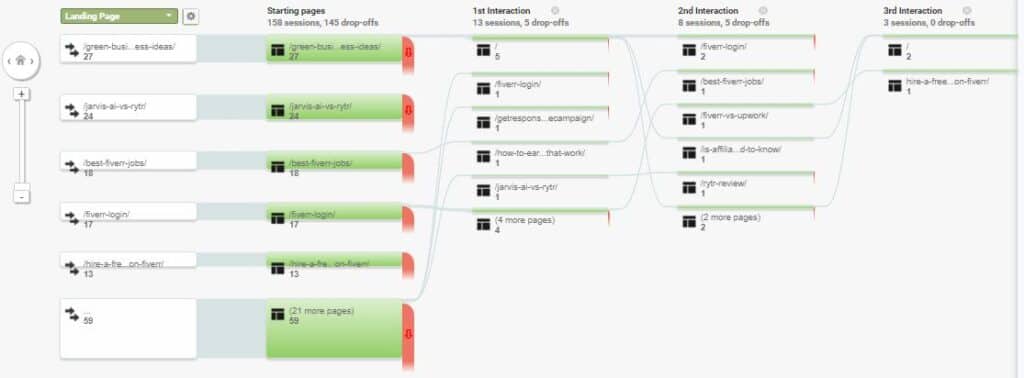
To get started, you will enable User IDs, that way you can track how users signed into accounts.
With User ID enabled you can track the accurate session for visit. Bear in mind that a user can visit your site with a smartphone or PC.
If the User ID is disabled it will count as two separate sessions. While it will count as a single session no matter the device provided the User ID is enabled.
That brings us to the setting up of User ID on GA. It is another complex process that can frustrate you if you don’t have a background in data analysis or coding. Here is how to set up User ID on GA.
You can track visitors journey vis the following ways:
- Segmentation
- Site Search
- Behavior Flow
- User Explorer
- Previous Page Path
Oribi ( Visitors Journey)
Oribi makes tracking of visitors’ journey simple. You can see every step a visitor took on your site. You can track the journey of a specific segment using the smart filter. In addition, you can use email addresses to match the behavioral activities of your buyer persona. This means that you can see the individual activities your email subscribers performed on your site.
Examples could be:
- Average session duration
- Device type
- Traffic source
- Location
- Number of visits
- Email address, etc
It is even interesting to know that you can see the traffic source that generated more qualified leads and conversion using the Call to Action button.
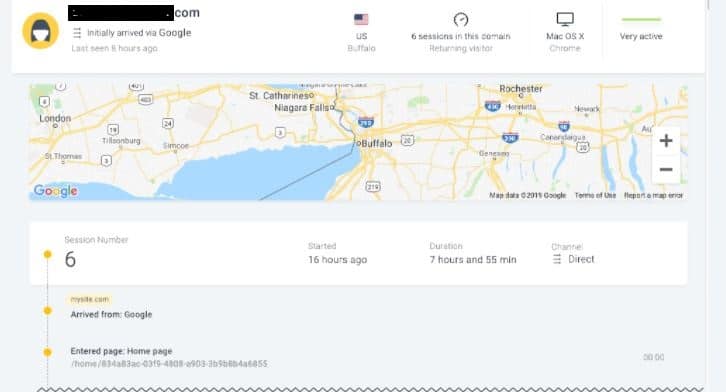
Verdict: Oribi makes it easier to track visitors’ journeys and see how they convert, unlike Google Analytics that requires you to set up User IDs to do the same.
5. Ease Of Use
Nowadays, nobody wants a tool that has much learning curve. For instance, you run a marketing agency. It is impossible for all your team members to have a background in web analytics.
However, marketing reports must be created and reported to clients, shared among colleagues, and also used to make better marketing decisions. That’s where ease of use comes to play in this Oribi vs Google Analytics comparison.
Oribi ( Ease Of Use)
With the few comparisons we have made so far, you can get the picture that Oribi is easier to use. Tracking funnels & campaigns, and creating reports do not require any coding. It means that your team members can easily do web analytics on Oribi without any assistance. The user interface is simple to explore making it user-friendly and time-saving.
Google Analytics( Ease Of Use)
To a Data Analyst or someone with coding skills, Google Analytics is easy to use. But it will be the opposite for someone with no background in data analysis. You need to have coding skills to carry out advanced tracking in GA. Setting up Tag Manager, UTM, are complex. Also creating reports on GA is not easy as Oribi although GA offers more report templates.
Verdict: Oribi is easier to use compared to GA. You can do all your tracking and analysis without coding skills. That saves time and energy. In addition, Oribi presents data in a way that anyone can easily digest and understand.
Watch the video below to understand how Oribi works
6. Trends and Insights
Trends and Insight can impact your business positively and negatively. Hence the need to track them to know when to make necessary changes. It is a common feature that Google Analytics and Oribi offer and we will look at them in this section.
Oribi ( Trends and Insights)
You cannot lose grip of trends in your business with Oribi because it highlights what you need to pay attention to. For example, you can see where your visitors get lost in your conversion funnel.
You can see your top-performing pages, marketing channels, and location that are driving quality leads to your funnel. The interesting here is that Oribi presents trends and insights in a visually appealing format. Thereby making it easy for anyone to understand and take action if need be.
Take a look at the screenshot below.
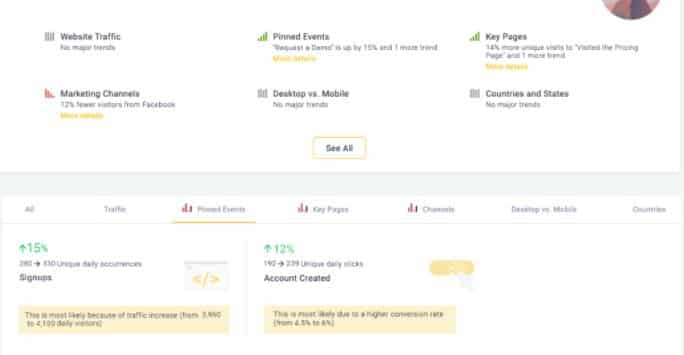
Google Analytics( Trends and Insights)
GA allows you to create insight from the scratch. But this is a complex process that involves you setting conditions under which such insights and trends can generate successfully.
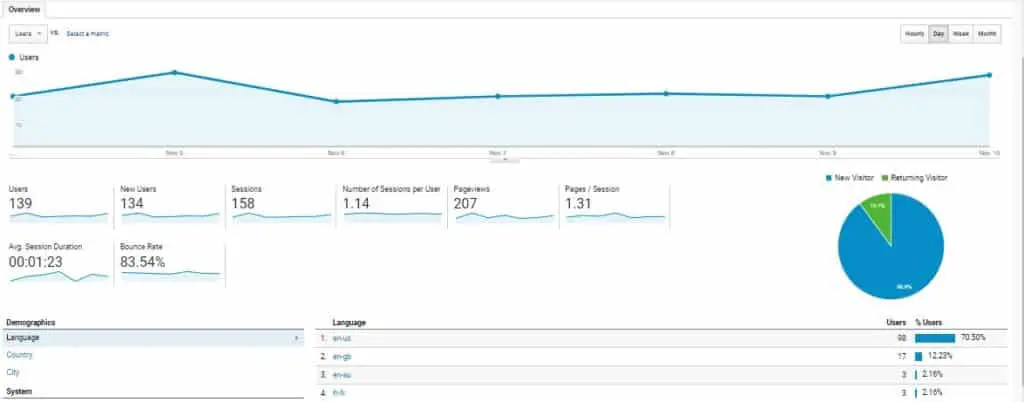
You can decide to go with the automatic insight which uses Artificial Intelligence to detect emerging trends and notify you automatically.
This is not the same with Oribi that does the heavy lifting for you and highlights the actionable steps you need to take to achieve your goals.
Verdict: Oribi is better than Google Analytics in this regard. You don’t need to set up custom insights. Oribi does that and presents you with trends and insights on your site including the behavior of users towards your CTA button.
7. Integration
Connecting your web analytics tools with other favorite marketing tools makes it easier to achieve your marketing goals. There are many marketing software that integrates with Google Analytics and Oribi and we will look at them below.
Oribi Integration
Oribi integrates with 6 marketing tools:
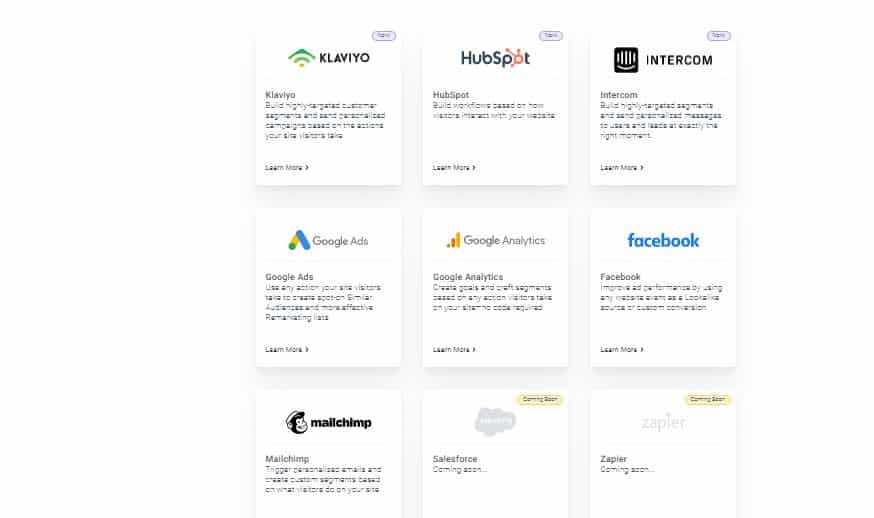
- Hubspot
- Klaviyo
- Google Ads
- Mailchimp
- Google Analytics
- It also has plans to integrate with:
- Zapier
- Salesforce
- Intercom
Google Analytics Integration
Google Analytics integrates with more tools. It has a reporting API that you can use to build your own integration. GA stands out when it comes to integration.
According to a survey from Databox, 58.1 percent of marketers are satisfied while 41.9 percent are very satisfied with various Google Analytics integration they have tested.
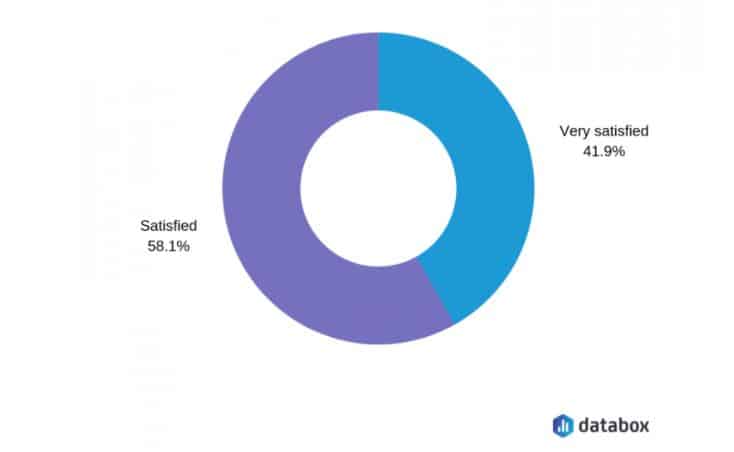
That brings us to some marketing tools that you can integrate with Google Analytics:
- Databox
- CallRail
- Analytics Edge
- Shopify
- WordPress
- Hubspot
- Activecampaign
Verdict: Google Analytics is far better than Oribi in terms of integration. It connects with more marketing automation tools and also allows you to integrate your tool using the API.
8. Pricing Plan
It’s time to look at the amount you need to pay either monthly or yearly to use these web analytics tools. It makes no sense to fall in love with the features of these analytics tools only to realize that your budget can afford them.
Oribi Pricing Plan
Oribi has 3 different pricing plans:
Business Website: Starting from $514/ month.
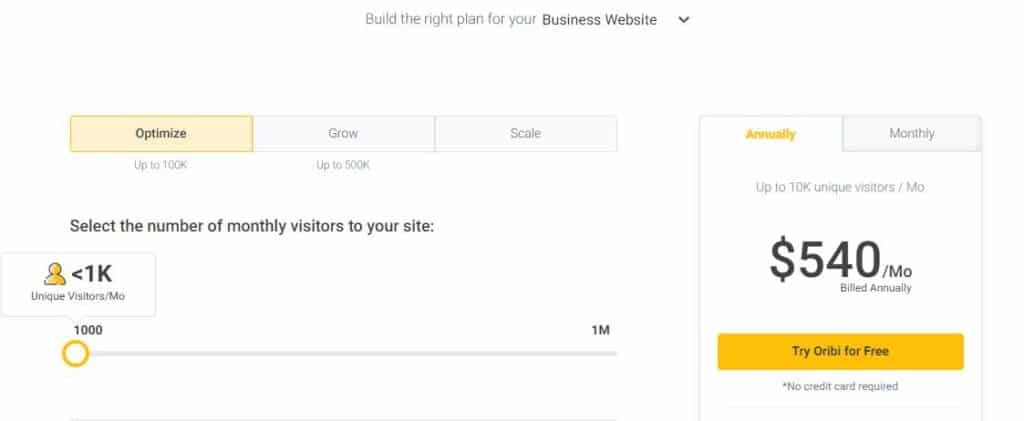
Ecommerce Shops: Starting from $450/month.
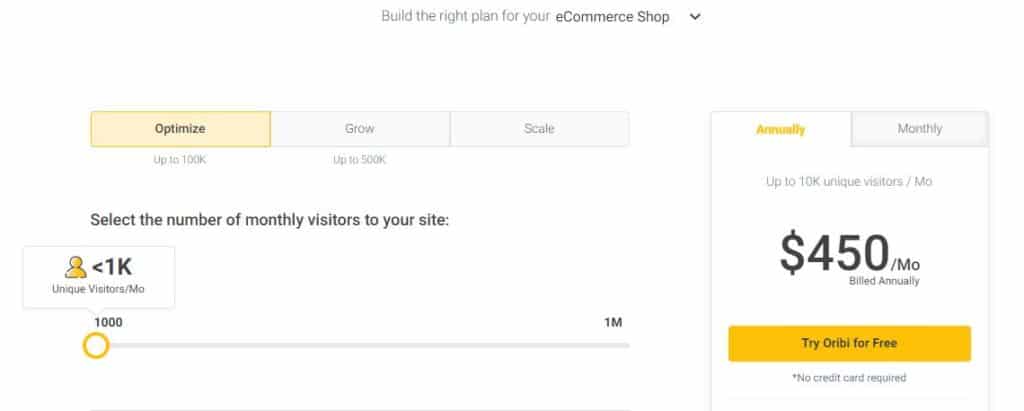
Marketing Agency: Starting from $750/month.
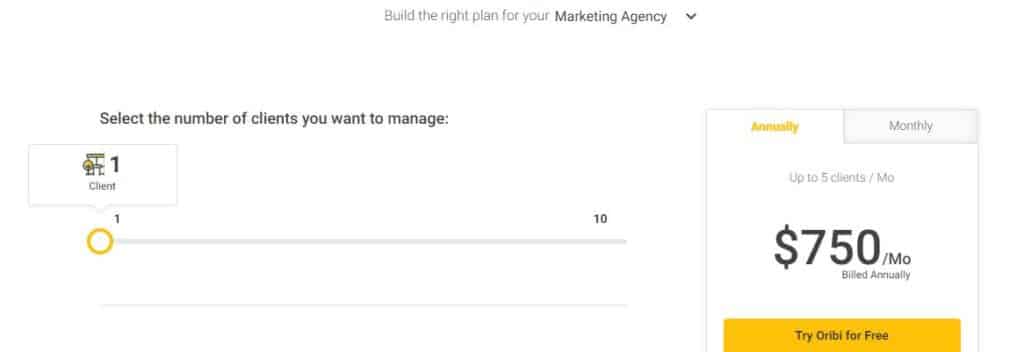
This is suitable for top marketing agencies that manage websites for clients. You will need to schedule a tour with the sales team if you have 10+ clients with who you manage their websites.
Note:
- Business website and Ecommerce pricing plans have Optimize, Grow, and Scale sub plans.
- The Marketing Agency is the highest pricing plan.
- The amount you pay depends on the number of unique visitors your website or that of your clients get monthly.
- Pricing plans are billed annually.
- There is a discount for an annual plan
- For Business website and Ecommerce Shop pricing, you will schedule a tour with the sales team if you record 300K and above monthly unique visitors.
Google Analytics Pricing Plan
Google Analytics has a premium plan which few digital marketing experts are aware of. It is meant for large companies and enterprises with a high volume of traffic or those that manage high-traffic websites for clients.
Your data is guaranteed by SLA and you have access to advanced and sophisticated features which are not available on the forever free plan. It goes for $150,000/ year and you can purchase it from an authorized reseller.
Verdict: Oribi is more affordable than Google Analytics. None of the annual plans are up to $10,000.
I doubt if the custom pricing for monthly unique traffic of 300K above can cost up to $150,000 per year. Even the custom pricing for 10+ clients for the Marketing Agency plan can’t be up to $150K/year.
9.Customer Support
Google Analytics vs Oribi comparison won’t be complete without looking at the type of customer support they offer.
This is important because no matter how tech-savvy you are, chances are you may encounter a challenge while using these tools. And you will call on customer support for help.
Google Analytics Customer Support
You can get help through live chat or email support. However, it is not 24/7. If you subscribe to the premium plan of $150,000/year, you are sure of dedicated customer support. If you plan to use the forever free plan, then the Google Analytics help center is where you can get valuable information. You can also watch Youtube videos.
Oribi Customer Support
Oribi offers support via email. It also has a help center and resources that can help you resolve issues yourself. It is even interesting to know that you get a dedicated conversion expert who will assist you set up Oribi when you subscribe to any of the pricing plans on Oribi.
The conversion expert will also provide you with strategies that you can use to achieve your marketing goals.
Verdict: Oribi wins. A dedicated conversion expert is assigned to you once you subscribe to any paid plan no matter the amount.
This is not the same with GA where you can only get dedicated customer support when you subscribe to the $150,000/ year premium plan.
Oribi vs Google Analytics( Pros & Cons)
Let’s look at the good sides and bad sides of these web analytics tools for a better understanding of the comparison we did above
Oribi: Pros
- The pricing plan is affordable compared to Google Analytics
- No coding skill is required to track or generate a report
- It is beginner-friendly
- You don’t need to be a data analyst to use it
- Highlight actionable steps you need to take to achieve your marketing goals
- Generates and presents reports in an understandable style.
- Offers you a dedicated customer support
- Offers a free trial
- Has event correlation feature
Oribi: Cons
- Lacks more report templates and dashboards
- Integrates with a few marketing automation tools
Google Analytics: Pros
- Offers more report templates and dashboards
- Integrates with more marketing tools. You can even connect your favorite tool using its API
- It has a forever free plan
Google Analytics: Cons
- Users with no coding or data analysis background may find it difficult to work with GA
- The pricing plan is expensive compared to Oribi
- Customer Support is not fast on the free plan.
- Lacks event correlations feature
Frequently Asked Questions
Before I call it a wrap, let us look at a few questions that you may ask as it concerns these analytics tools.
Do you have to pay for Google Analytics?
Yes if you want to enjoy advanced features that can boost your marketing campaign. The premium plan of Google Analytics goes for $150,000/year. Big companies and enterprises with a high number of clients prefer it.
No. If your business has no need for advanced web analytics features. Then you can use the forever free plan.
How long is the Oribi free trial?
Oribi’s free trial lasts for 14 days after which you are expected to upgrade to any of the pricing plans. However, the free trial of Oribi doesn’t require credit card details.
Is Oribi better than Google Analytics?
It depends on your need. If you or your team want to be data-driven without a headache, then Oribi is better. No coding skill and anyone in your team can use it to create and generate reports for clients. It is also more affordable compared to Google Analytics.
Final Thought
I trust by now that you’re in the position to make an informed decision with regards to Oribi vs Google Analytics comparison. Here is what you should do:
Place the features we discussed above side by side against your needs in web analytics tools. That way you can identify which suits your business website, marketing agency, or e-commerce store.
If I’m to suggest, Oribi is what you need if you want web analytics made easy. If you are skilled in coding, data analysis and like challenging tasks then you will find Google Analytics interesting.
Want to learn more about web analysis tool that is easy to use like Oribi, check out this Diib review.
